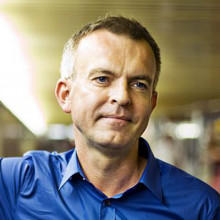Polish literature

Wojciech Tochman
(born 1969) reporter, non-fiction writer. He has twice been shortlisted for the NIKE Literary Prize and has won the Polish Book Publishers Association Award.
He began his career as a reporter at the youth weekly Na przełaj before leaving school, and soon after he joined the first reporting team at Gazeta Wyborcza. His reports from this period were published in a book, Stairs Don’t Burn (2000, 2006). Before he got his masters degree at Warsaw University he went to Bosnia with a convoy organised by humanitarian aid worker Janina Ochojska. He then went back to the Balkans repeatedly for many years, and the book Like Eating A Stone is the result of those journeys. His next book was Dear Daughter (2005), the moving account of his efforts to find out what had happened to his missing friend, a reporter called Beata Pawlak, who turned out to have been killed in a terrorist attack on the island of Bali.
For several years Tochman was involved in activities aimed at finding missing people. From 1996 to 2002, he ran a programme called “Anyone Who Saw, Anyone Who Knows” on the Telewizja Polska TV channel. In 1999 he founded the ITAKA Centre for the Search for Missing People.
In 2009, with Mariusz Szczygieł and Paweł Goźliński he co-founded the Reportage Institute.
"I don’t write about graves. I tell the stories of people who are alive but standing over stinking holes in the ground. I write about what they carry inside them – that is what matters to me. That is the mystery I want to get to grips with. Often, at the very start of my work, I know I will never be able to solve it, because often it’s not a human mystery, it isn’t a mystery that can be understood by man. That’s exactly why it is a mystery. I like to look into this sort of secret, because I like not understanding, not comprehending, wondering. In reportage the information gathering stage is quite different from the writing stage, and I am excited by the fact that I never really know where a report will take me. A reporter should always be wondering, not knowing, but always seeking answers. Someone who knows everything might be very wise, but he certainly isn’t a good reporter."
Tygodnik Powszechny no. 11/2005
Author's website www.tochman.eu
TRANSLATIONS:
Arabic:
- Maḏbaḥat al-Būsna [Jakbyś kamień jadła], transl. Ibrāhīm ʿUmar, Al-Qāhira: Wikālat Sfinks, 2010.
Bosnian:
- Kao da jedeš kamen [Jakbyś kamień jadła], transl. Slavko Santić, Izdavačka kuća Magistrat, Sarajevo 2004.
Czech:
- Pánbůh zaplat [Bóg zapłać], transl. Barbora Gregorová, Praha: Dokořán, 2013.
- Jako bys jedla kámen [Jakbyś kamień jadła], transl. Lenka Kuhar Daňhelová, Žilina: Absynt, 2017.
Dutch:
- Dochtertje. Zoektocht naar de vermiste journaliste Beata Pawlak [Córeńka], transl. Ewa van den Bergen-Makala, Breda: De Geus, 2009.
English:
- Like eating a stone. Surviving the Past in Bosnia [Jakbyś kamień jadła], transl. Antonia Lloyd-Jones, London: Portobello Books, 2008; New York: Atlas & Co, 2008.
Finnish:
- Kuin olisit kiveä syönyt [Jakbyś kamień jadła], transl. Tapani Kärkkäinen, Helsinki: Like, 2005.
French:
- Mordre dans la pierre [Jakbyś kamień jadła], transl. Margot Carlier, Montricher [Paris]: Les Éditions Noir sur Blanc, 2004.
- Absentia [Nieobecność] in anthology : La vie est un reportage. Anthologie du reportage littéraire polonais, ed. and transl. Margot Carlier, Montricher [Paris]: Les Éditions Noir sur Blanc, 2005.
- Aujourd’hui, nous allons dessiner la mort [Dzisiaj narysujemy śmierć], transl. Margot Carlier, Lausanne [Paris]: Les Éditions Noir sur Blanc, 2014.
- Eli, Eli, transl. Kamil Barbarski, Lausanne [Paris]: Les Éditions Noir sur Blanc, 2018.
Italian:
- Come se mangiassi pietre [Jakbyś kamień jadła], transl. Marzena Borejczuk, Rovereto: Keller, 2010.
- Oggi disegneremo la morte [Dzisiaj narysujemy śmierć], transl. Marzena Borejczuk, Rovereto: Keller, 2015.
Portugese:
- Hoje vamos desenhar a morte [Dzisiaj narysujemy śmierć], transl. Eneida Favre, Veneza: Editora Âyiné, 2019.
- Como se você comesse uma pedra [Jakbyś kamień jadła], transl. Eneida Favre, Veneza: Editora Âyiné, 2019.
Russian:
- Jakbyś kamień jadła w „Innostrannaja Literatura”, Moskwa 2004.
Slovak:
- Akoby si kameň jedla [Jakbyś kamień jadła], transl. Slavomír Bachura, Žilina: Absynt, 2015.
- Eli, Eli, transl. Slavomír Bachura, Žilina: Absynt, 2017.
Spanish:
- Como si masticaras piedras [Jakbyś kamień jadła], transl. Katarzyna Olszewska Sonnenberg, Madrid: Libros del K.O., 2015.
Swedish:
- Jag väntar under adress: Berlin [Czekam pod adresem: Berlin]; Moder Mejra finner sina barn [Matka Mejra szuka swoich dzieci] in anthology Ouvertyr till livet, ed. and transl. Maciej Zaremba, Stokholm: Brombergs, 2003.
Ukrainian:
- Ти наче камінь їла [Jakbyś kamień jadła], transl. Andrij Bodnar, Kiev, Nasz Czas, 2009.